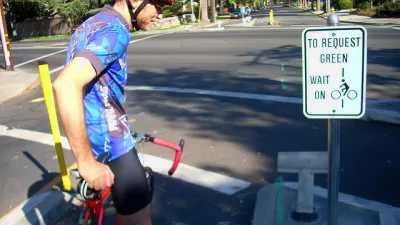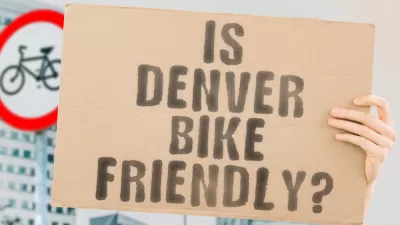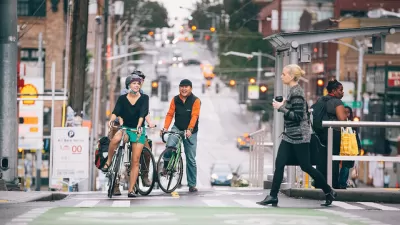The National Transportation Safety Board recommends that all 50 states require people on bikes of all ages to wear helmets.

"A federal safety board issued a surprise recommendation for mandatory bike helmet laws in all 50 states — unanimously approving a last-minute resolution that had not been recommended by the board’s own staff," reports Gersh Kuntzman.
"The National Transportation Safety Board voted 3-0 to recommend helmet laws even as staff members reminded panelists that such laws may reduce overall cycling, and lead to the 'unintended consequence' of more road fatalities because fewer cyclists will mean less pressure on local officials to build the kind of protected infrastructure that is proven to improve cyclist safety."
The surprise element came from the fact that the recommendation was not included in the recommendations drafted by staff prior to the meeting. The recommendation came from a list minute addendum created by board member Jennifer Homendy.
There was some debate on the subject prior to the vote. On the side of board members seeking helmet laws is data that credits helmets with reducing the likelihood if injuries for people on bikes by 48 percent. Helmets are also credited with "[reducing] serious injuries by 60 percent and [reducing] traumatic injuries by 53 percent," according to Kuntzman.
On the other side is evidence from The Netherlands, where high levels of bike safety are found in a country with very low rates of helmet use. Staff analyst Dr. Ivan Cheung testified that "helmet use often discourages cycling, prompting him to refer to the 'unintended consequences' of mandating their use."
FULL STORY: SURPRISE! Federal Panel Seeks Mandatory Helmet Laws

Trump Administration Could Effectively End Housing Voucher Program
Federal officials are eyeing major cuts to the Section 8 program that helps millions of low-income households pay rent.

Planetizen Federal Action Tracker
A weekly monitor of how Trump’s orders and actions are impacting planners and planning in America.

The 120 Year Old Tiny Home Villages That Sheltered San Francisco’s Earthquake Refugees
More than a century ago, San Francisco mobilized to house thousands of residents displaced by the 1906 earthquake. Could their strategy offer a model for the present?

Alabama School Forestry Initiative Brings Trees to Schoolyards
Trees can improve physical and mental health for students and commnity members.

NYC Outdoor Dining Could Get a Re-Do
The city council is considering making the al fresco dining program year-round to address cost concerns from small businesses.

HSR Reaches Key Settlement in Northern California City
The state’s high-speed rail authority reached an agreement with Millbrae, a key city on the train’s proposed route to San Francisco.
Urban Design for Planners 1: Software Tools
This six-course series explores essential urban design concepts using open source software and equips planners with the tools they need to participate fully in the urban design process.
Planning for Universal Design
Learn the tools for implementing Universal Design in planning regulations.
Ada County Highway District
Clanton & Associates, Inc.
Jessamine County Fiscal Court
Institute for Housing and Urban Development Studies (IHS)
City of Grandview
Harvard GSD Executive Education
Toledo-Lucas County Plan Commissions
Salt Lake City
NYU Wagner Graduate School of Public Service





























